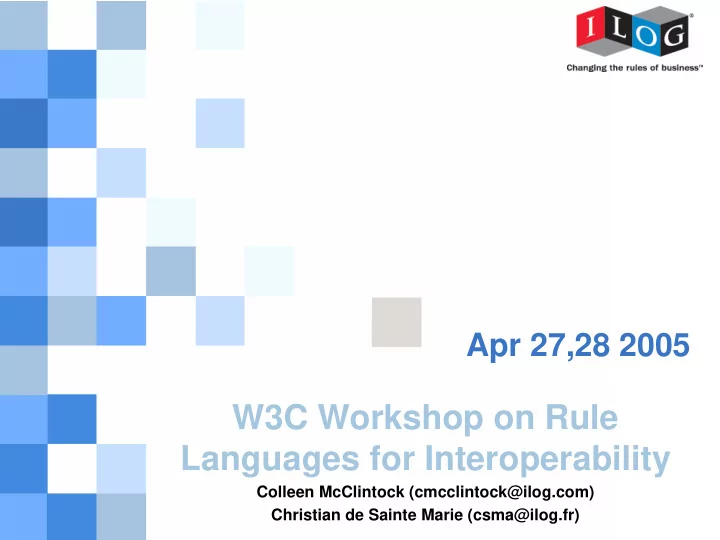

Apr 27,28 2005 W3C Workshop on Rule Languages for Interoperability Colleen McClintock (cmcclintock@ilog.com) 1 Christian de Sainte Marie (csma@ilog.fr)
W3C Workshop on Rule Language Interoperability Business Rules and Product Rules • Business rules are highly specific and structured statements that constrain some aspect of a business process or activity, and that control or influence its behavior. • Business rules execute some actions that enforce underlying business policy. • Production rules are a convenient representation for most business rules. Driver must be 21 or older If the driver in a car rental request is less then 21 years old Then reject the car rental request 2
W3C Workshop on Rule Language Interoperability Requirements for a Standard Rule Language • Execution of Rules • Expressiveness of the Language • Usability and Adoptability of the Standard • Compatibility with Other Standards 3
W3C Workshop on Rule Language Interoperability Execution • A standard rule language must be able to represent rules in a way that is unambiguous with respect to execution. • Rules applied on the same data in two different environments must produce identical results • 25 commercial products and 18 open source products in the Java rule engine space • Forward-chaining RETE engines, decision tables, decision trees, procedural engines… 4
W3C Workshop on Rule Language Interoperability Expressiveness • A standard rule language must be expressive enough to represent most (if not all) of the rules allowed by the main business rule engines. • Rule authors should not be required to write rules using the standard rule language • Condition part of rules must include: typed first order queries, with variable definition and binding, and standard logical, arithmetical, and set theoretical operators • Action part of rules must include: assert, retract, modify and execution of application specific functions 5
W3C Workshop on Rule Language Interoperability Usability and Adoptability • Mainstream business rule engines must implement the standard • Translation from/to internal languages used by main rule engines must be reasonably simple • XML-based format 6
W3C Workshop on Rule Language Interoperability Compatibility • OMG PRR – Modeling of business rules and exchange of business rules between modeling tools and engines • JCP JSR-94 – standard API for acquiring and using a rule engine • Compatible and convergent standards for modeling, executing, and exchanging rules 7
W3C Workshop on Rule Language Interoperability A Layered Architecture Application-specific information models APPLICATION VOCABULARY � application-specific languages Imports Unambiguous composition semantics � languages specific to classes of rule/inference engines EXECUTION/ INFERENCE Imports Uniform way of representing assertions LOGICAL EXPRESSIONS � one common language 8
Recommend
More recommend